- Home
- John Barth
Letters Page 20
Letters Read online
Page 20
The study of History was Father’s sanctuary from its having been practised upon him in the past, and his preparation for practising it upon others in the future. From the present—the revolutionary fervor which was sweeping the colleges of Harvard, Yale, Princeton, even William & Mary in the late ’60’s and early ’70’s—he remain’d aloof. His student friends from Princeton (John Armstrong & Aaron Burr are the two we shall remember) were ready by 1774 to fight for American independence; his Yale tutee Joel Barlow was already making plans, at Father’s suggestion, for an American Aeneid (but Father had in mind a satire!); and his closest friend in New Haven, Mr. Benedict Arnold—a bright young merchant in the West Indies trade whose boyhood had been as adventurous as Father’s—had organized a company of Connecticut militia. But while he did not dismiss as specious the arguments for independence, Father was skeptical enough (and Canadian enough) to see two sides to the matter: a prerequisite to the tragical view, tho not its equivalent.
His chief concern, however (so he claim’d), was not the inevitable misunderstandings & conflicts of interest betwixt governors & govern’d 3,000 miles apart; it was the invasion of white settlers across the Appalachians into Indian lands, in despite of George III’s proclamation. He could not believe that the confederated state governments being proposed by the Committees of Correspondence & the Continental Congress would be inclined to check that invasion. Exempt from patriotism, he saw the self-interest & bad faith on both sides of the Atlantic, and a dozen routes to peaceful compromise, none of which bade especially well for the Indians. If, on the other hand, war were actually to break out betwixt the British & the colonials, each would scramble to use the Indians against the other—in particular the Six Nations of the Iroquois, whose situation once again would be, for better or worse, strategic.
In April of ’75, when the shooting commenced at Lexington & Concord, Father was in nearby Cambridge, poring thro the library of Harvard’s old Indian College for references to the Bloodsworth Island Conspiracy, and deciding that he had had enough of Yale’s Congregationalist orthodoxy, perhaps of the academical life. His friend Arnold rusht up from New Haven to add his company of militia to George Washington’s army, assembling on the Common. His friend Burr hurried over from law school in Litchfield to join that army. Father introduced them. They could not persuade him to enlist, nor he dissuade them.
“We must have Canada!” they declared. Father understood, with a chill, that “we” already meant The United States of America. If Canada were not among those states, they argued, the British could crush the unborn republic betwixt its armies to the north & west and its navies to the east & south. The key to Canada was old New France, never easy under British rule: Arnold’s strategy, in which General Washington & the Massachusetts Committee of Safety concurr’d, was a three-prong’d attack: one force (General Montgomery’s, say) should move down the St. Lawrence from Maine to take Quebec; a 2nd (Arnold’s own, he hoped) up thro Lake Champlain to take Crown Point, Ticonderoga, and Montreal; a 3rd thro the Mohawk Valley to Niagara. “We” would then control the St. Lawrence &: the Lakes; Canada would be “ours.” The French would surely help, in hopes of regaining New France for themselves; the habitants could be relied upon at least not to aid the British. The great uncertainty was the allegiance of the Six Nations: Could my father not be prevail’d upon to accept a commission & persuade the Mohawks to remain neutral, the Senecas to lay siege to Forts Erie & Niagara?
He could not, tho he affirm’d the soundness of the strategy. He urged young Burr to enlist with Arnold instead of Washington if he wanted action, and caution’d Arnold to beware the jealousy betwixt the Massachusetts & Connecticut Committees of Safety, which, together with the rivalry & reciprocal sabotage common to generals, was bound to make joint operations all but impossible. He himself, Father declared, was withdrawing to another Cambridge: not the one on the river Cam in Mother England, where his grandfather had gone to school with Henry More & Isaac Newton, but the one in tidewater Maryland. Not his fatherland (Heaven forfend!), but his grandfatherland, where that same ancestor had made certain decisions respecting his own deepest loyalty.
Burr & Arnold had not heard of this Cambridge, nor were they much inclined to hear. Was it in the neighborhood of Annapolis? One day’s sail, my father replied, but a world away, and the last white outpost before the wild & trackless marshes. Above this Cambridge the river-names were English: Severn, Chester, Wye, Miles—it was a wonder the Chesapeake itself had not been dubb’d the Wash, or the Bristol. But at this Cambridge it was the Great Choptank, larger than Cam & Charles together, with the Thames at Oxford thrown in; and after the Great Choptank the Little Choptank, the Honga, Nanticoke, Wicomico, Manokin, Annemessex, Onancock, Pungoteague, Nandua, Occohannock, Nasswadox, Mattawoman—
Enough, cry Burr & Arnold: ’tis the beat of savage drums! To which my father replies: ’Tis the voice of the one true Continental, his vanisht forebears, in whose ranks he was off come morning to enlist.
All this my mother told me—your grandmother Nancy, who is about to enter the story. Andrew III’s investigation of his latefound father had led him from Annapolis to Castines Hundred; my own father’s re-investigation of that same ancestor reverst that route, as he was determined to reverse his father’s judgement of the 3rd Henry Burlingame. From Castines Hundred, where he paid his respects to the incumbent Baron (sire of the current one), he made his way 1st down to Annapolis, to search the records of the province and dig thro the library at St. John’s College; then over the Bay to Cambridge & Cooke’s Point, once the seat of the family, to consult more local records & the memories of old inhabitants.
From one of these latter—an aged, notorious former whore named Mag Mungummory, he learnt three valuable things. 1st, that Ebenezer & Anna Cooke’s childhood nurse, Roxanne Russecks, née Édouard, had had a romance with their father, Andrew Cooke II, and borne him a daughter named Henrietta Russecks (as shown on the family tree, or thicket, in my last), who herself later bore a daughter named Nancy Russecks McEvoy. 2nd, that Mag Mungummory’s mother, Mary, call’d in her prime “the Traveling Whore o’ Dorset,” had once known Henry Burlingame III himself, in various of his guises, & fear’d him—tho of his disputed role in the Bloodsworth Island Conspiracy, Mag knew nothing. 3rd, that about the same time when Ebenezer Cooke regain’d his lost estate by marrying the whore Joan Toast, and Henry Burlingame III left Cooke’s Point for Bloodsworth Island, and Henrietta Russecks married one John McEvoy, this Mary Mungummory had purchased from Roxanne Édouard Russecks a tavern own’d by the miller Harry Russecks, Roxanne’s late husband. She had establisht a brothel in its upper storey and flourisht with the common-law husband of her old age, the miller’s brother, Harvey Russecks. Mag herself, the fruit of this autumnal union, had inherited the business on her parents’ death and, tho nearly 80 at the time of this interview, continued to operate both tavern & brothel with the aid of a young woman she’d taken in as an orphan’d relative four years past.
The establishment was the same in which my father was lodging, and where this conversation was taking place: Russecks Tavern, near Church Creek, below Cambridge. The young woman—herself chaste, tho uncommonly worldly for her age—was the same he had been unable to take his eyes off thro this interview as she bustled about the place. More, she was the Nancy Russecks McEvoy aforemention’d, whose family had been lost at sea in the ship Duldoon out of Piraeus for Cadiz in 1771. Then only fifteen, she had made her way from Paris to Philadelphia & thence to Maryland to seek her one known relative, her great-uncle Harvey Russecks. In his place she found his daughter (still call’d by her old working name, “Mag the Magnificent,” but by Nancy rechristen’d “Magnanimous Maggie”), who had welcomed her as a grandchild, seen as best she could to her education, protected her from the establishment’s rougher patrons—and gratified, insofar as she was able, the girl’s tireless curiosity about her ancestry. Perhaps Mr. Burlingame could be of assistance in this last? Hither a moment, pretty Nancy…
And so my mother & father meet—he nearly 30, she nearly 20—and their matchmaker withdraws for the present, tho she has one crucial thing more to do for us. And they very soon fall in love, Henry & Nancy, whilst the country goes to war. Colonel Arnold’s plan to move against Ticonderoga has been approved by Massachusetts; but to mollify Connecticut, which is jealous of both Massachusetts & New York, Arnold must yield command of the operation to the “Vermonter” Ethan Allen, who himself would separate New Hampshire from New York even if it means “making this state a British province” (so he assures Governor Haldimand of Canada in secret letters!). Even so, jealous officers in Massachusetts mount an inquiry into Arnold’s “conduct,” about the same time that Ethan Allen is superseded by a rival of his own as commander of the “Green Mountain Boys.” Both men angrily resign their commissions & return to Cambridge, where Burr, having ignored his tutor’s advice and stay’d with Washington, is dying of inaction. All three take up the Canadian campaign—but Allen, under General Montgomery, gets the key assignment of moving from Ticonderoga to take Montreal, whilst Arnold & Burr must take the bitter northern route thro the Maine woods from Castine—named for our 1st émigré Baron—to Quebec. (The 3rd crucial thrust, to Niagara thro the Mohawk Valley, is never mounted.)
As A. & B. freeze, Nancy & Henry bask in Chesapeake Indian summer (still call’d Goose-summer then, after the millions of wild geese moving down from Canada as “our” troops move north); they admire the rusty foliage & browning marsh grass, the endless clamoring vees in the limpid sky; they move thro the gossamers named for the season named for the geese and spun delicately out, like their own feelings, from every reed, rope, twig.
Burr & Arnold, reaching Quebec in mid-November with what remains of their company after the ordeal of crossing the Maine wilderness, find the British garrison forewarn’d (not impossibly by Ethan Allen himself), and are obliged to wait in freezing “siege” until Allen & General Montgomery come up victorious from Montreal. There they shiver, starve, & curse—Joel Barlow’s three older brothers amongst them—whilst Barlow himself frets thro his sophomore year at Yale writing mock-heroic couplets on the subject of undergraduate snowball battles—“And Jove descends in Magazines of Snow”—& down in the golden marsh my parents come ardently together.
Or would so come! But ’tis we who come now to that curse of the male Burlingames I mention’d in my 1st. Andrew Cooke III was a man of normal parts, like myself: Andrée’s insistence that he get her with child ere they marry was no reflection on his manliness, only a kind of test laid on him in view of his age & innocence, which test he lovingly (if slowly) rose to. But my father, like his namesake, was all but memberless—and, alas, had not yet rediscover’d his grandsire’s secret. Here, it may be, is another clue to “Alexis Cuillerier’s” rage against the Fisher child: it is common practice amongst the Indians to dismember male prisoners in the course of torturing them; any males among themselves who happen to have been by nature underendow’d are teased as having been thus captured and tortured—” ’tis well you escaped with your nose & ears,” et cetera—and are further advised, if they have not the womanly nature of a berdache, to take a girl-child to wife…
His celibacy at Princeton & Yale, too, we may now take understanding pity on; for while undergraduates in those Puritan longitudes were not given to the wenching of their Oxbridge counterparts, they were normally preoccupied with courtships & flirtations. ’Twas simple shame, my mother told me in later years, drove my father to the excesses that punctuate his life. He had not his namesake’s “cosmophilism”; he wanted only & simply to husband Nancy Russecks McEvoy, and he could not do it, and the frustration very nearly unhinged him. Indeed, not knowing the root of the problem, as ’twere, my mother thot him 1st uncommonly proper, then uncommonly shy, at last uncommonly odd—whether madman or faggot she could not decide. For things had reacht that point betwixt them, by his initiative as much as hers, where “St. Anthony himself would have had a time of it.”
When at last the truth came out, she was immeasurably relieved. “I straightway ask’d him,” she told me, “could he not so much as piss with it? He could, said he, tho his aim was not the best. And had he not, says I, ever had a lusty dream, as young men will, and woken to find his musket fired? Would it were a musket, says he, even a proper pistol; but fire it did, especially of late, in hot dreams of me. Then marry, says I, ’twere strange indeed if such a malady be unknown to the upper storeys of the Russecks Tavern, and the learned doctresses there have no prescription.” So leading him by the hand, off she goes to Mag Mungummory, lets him blush & sweat whilst she lays the problem plainly out, and in 30 minutes has what Henry had not found in as many years. To wit:
…left alone, my Captain straightway set to work upon the eggplant, in the strangest manner I ever did behold. Forsooth, I was that amaz’d, that even some weeks thereafter, here in Jamestown, what time I set to recording this narrative in my Journall-booke, it was no light matter to realize it was true. For had I not observ’d it my owne self, I had never believ’d it to be aught but the lewd construction of some dissolute fancie. Endlesse indeed, and beyond the ken of sober and continent men, are the practices and fowle receipts of those lustfulle persons, the votaries of the flesh, that stille set Venus & Bacchus over chast Minerva, and studie with scholars zeal all the tricks and dark refynements of carnallitie! I blush to committ the thing to paper, even to these the privie pages of my Journall. Wch it is my vow, that no man shall lay eyes upon, while that I live…
& cetera. The writer was the 1st Henry Burlingame, his journal the Privie Journall of his capture, with Capt. John Smith, by Powhatan’s Indians in 1608. And what that old arch-hypocrite blusht to commit to paper—and forthwith went on so to commit—was the “Mystery of the Sacred Eggplant,” with the aid of which Smith had deflower’d Pocahontas & saved their necks: an encaustic, aphrodisiac decoction of Nux vomica, “Zozos,” oil of mallow, & the rest, stuft into a cored aubergine into which, in turn—
But no matter. We have the Journall: the “fowle receipt” shall be yours, when & if! Burlingame I made use of it to beget on Pokatawertussan, Queen of the Ahatchwhoops, the Tayac Chicamec (Henry Burlingame II), to whom the Journall (and its author’s justified Anglophobia) pass’d. Ebenezer Cooke discover’d its existence during his own Indian captivity at the hands of Chicamec in 1694; Burlingame III resorted to it to engender Andrew Cooke III on Ebenezer’s sister the following year. And then the Journall—together with Smith’s Secret Historie—disappear’d from sight.
“ ’Twas the dying wish of the whore Joan Toast, Ebenezer Cooke’s wife,” Mag Mungummory explain’d to the lovers, “that the receipt not be made public, lest we poor women be done to death. For what will turn your minnow into a buck-shad, will turn your buck-shad into a shark. Mister Ebenezer was all for destroying it, but his sister takes pity on the Burlingames to come, & on the Anna Cookes that love ’em—which is to say, the likes of Miss Nancy McEvoy! So they give both books to their old friend Mary Mungummory, as the trustiest judge o’ their application; and Mary gives ’em to her Mag; and Mag gives ’em to you.”
She did, and the lovers gratefully retired, with receipt & necessaries, into the gossamer woods. There Jove straightway descended in a shower of golden leaves, and Yours Truly was begot. What’s more, the rest of that same Privie Journall convinced my father, not only that the 1st Henry Burlingame had turn’d his back upon his English heritage & become an Ahatchwhoop Indian, but that Henry Burlingame III, encountering that record of his grandsire’s conversion, must surely have similarly so turn’d, being half Indian to start with! All hesitation then was purged from his own mind, which had anyhow never misdoubted its tendency, only its tactics: if the Appalachians were to dam the white invasion, either the “Continentals” (as the rebels now call’d themselves) must be supprest, or their “republic” kept weak & hemm’d round by territories of the Crown—especially by the Canadas, the key whereto, as always, was Niagara. And the key to Niagara
was the allegiance of the Iroquois…
For all this, my mother’s testimony. She & Father wed on New Year’s Eve day in Old Trinity, the church after which Church Creek is named, and in whose yard a pair of nameless millstones mark the grave of Henry Russecks, Nancy’s grandfather. Whilst their vows are exchanging, Arnold, Burr, Montgomery, & Allen make their belated joint attack on Quebec: a debacle in which Montgomery is kill’d & one of Joel Barlow’s brothers so severely wounded that he dies in the retreat.
It had been my father’s plan to go north early in the spring and try to persuade his friends to reconsider their positions, even perhaps to join him in a different kind of thrust along the Mohawk Valley. But by then I had made my existence known, and both Burr & Arnold (in response to discreetly worded postal inquiries from Church Creek) reaffirm’d their patriotism, tho readily acknowledging their disillusionment & the justice of Father’s earlier cautions.
He linger’d on therefore in lower Dorchester, as I linger now at Castines Hundred; and whilst like you I slept towards birth, he associated himself with the Marshyhope Blues, a militia company charged with protecting the rebel citizenry against Lord Dunmore’s flotilla, then in the Chesapeake; also against the Loyalist “Picaroons” assisting that fleet, and in particular against the depredations of one Joseph Whaland, a rogue who piloted British vessels up the estuaries of the County & made foraging raids with his own boats, which then struck their masts & hid in the labyrinth of the marsh. My father’s actual purpose (Mother said) was to keep this Whaland safely inform’d of the militia’s movements & of the several attempts to intercept him at sea. Shortly thereafter, Joseph Whaland and his picaroon schooner were captured in the lower County, where they had thot themselves perfectly secure.
“Your father was barely able to talk him out of prison,” my trusting mother said.

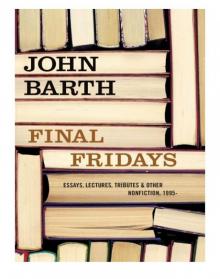 Final Fridays
Final Fridays Where Three Roads Meet: Novellas
Where Three Roads Meet: Novellas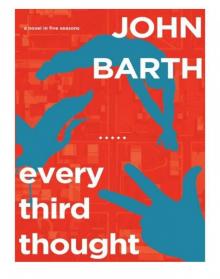 Every Third Thought: A Novel in Five Seasons
Every Third Thought: A Novel in Five Seasons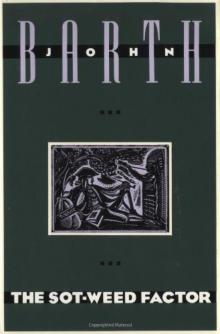 The Sot-Weed Factor
The Sot-Weed Factor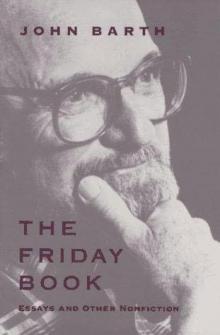 The Friday Book
The Friday Book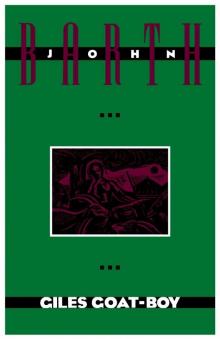 Giles Goat Boy
Giles Goat Boy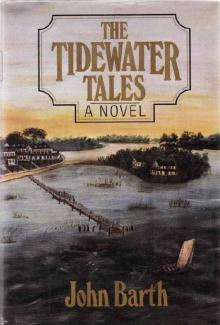 The Tidewater Tales
The Tidewater Tales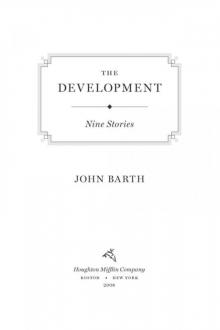 The Development
The Development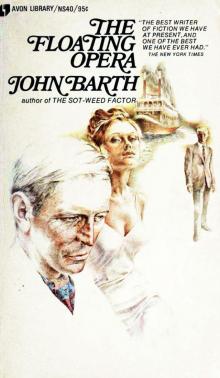 The Floating Opera
The Floating Opera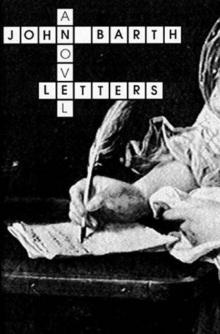 Letters
Letters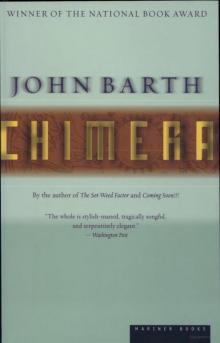 Chimera
Chimera Where Three Roads Meet
Where Three Roads Meet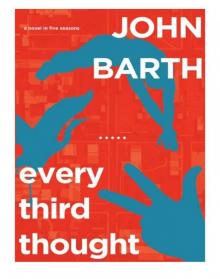 Every Third Thought
Every Third Thought